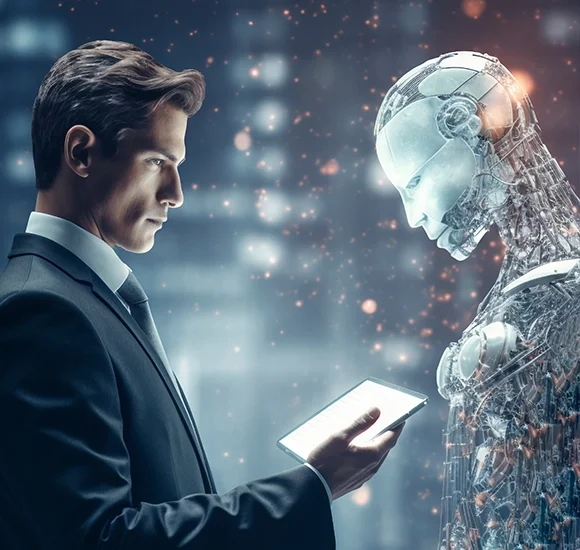Is AI the Future of Our World?
- June 1, 2024
- Posted by: shakeel
- Category: Innovation

Artificial intelligence (AI) isn’t science fiction anymore. It’s woven into the fabric of our daily lives, quietly transforming how we work, interact, and even think. From the moment you wake up to the glow of a smart device, AI is there, working behind the scenes. But what exactly is AI, and how is it impacting the current world?
At its core, AI refers to the development of intelligent machines capable of mimicking human cognitive functions. These machines can learn, analyze data, recognize patterns, and make decisions based on that information. AI encompasses a wide range of technologies, from the algorithms powering your social media feed to the self-driving cars on the horizon.
The impact of AI is vast and constantly evolving. Here are some key areas where AI is making a significant difference:
-
Revolutionizing Industries: AI is automating tasks across various sectors, from manufacturing robots on factory floors to AI-powered assistants in healthcare. This automation streamlines processes, improves efficiency, and allows human workers to focus on higher-level tasks.
-
Enhancing Customer Experience: AI chatbots and virtual assistants are transforming customer service by providing 24/7 support and personalized recommendations. You can now get answers to your questions or troubleshoot problems without waiting on hold.
-
Boosting Scientific Discovery: AI is accelerating scientific progress by analyzing massive datasets and identifying patterns invisible to the human eye. This is leading to breakthroughs in fields like medicine, materials science, and climate change research.
-
Personalization at Scale: From the news articles you see to the products recommended online, AI tailors experiences to your individual preferences. This level of personalization can be helpful, but it also raises concerns about data privacy and potential bias in algorithms.
-
The Future of Transportation: Self-driving cars are no longer just a futuristic concept. AI-powered vehicles have the potential to revolutionize transportation, making roads safer and potentially reducing traffic congestion. However, ethical considerations and safety regulations need to be addressed before widespread adoption.
Despite the undeniable benefits, AI also presents challenges. Here are some of the key concerns:
-
Job displacement: Automation through AI has the potential to displace jobs in certain sectors. While new jobs will be created, there’s a need for workforce development programs to help people transition to these new roles.
-
Bias and Fairness: AI algorithms are only as good as the data they’re trained on. If biased data is used, the AI system can perpetuate those biases. Mitigating bias in AI development is crucial to ensure fairness and ethical use.
-
Privacy Concerns: The vast amount of data collected to train AI systems raises privacy concerns. We need robust regulations to ensure responsible data collection and use.
The future of AI is full of possibilities, but it’s important to navigate its development responsibly. By acknowledging the challenges and working towards solutions, we can ensure that AI continues to enhance our lives for the greater good.
